ROBERT WILLIAMS BUCHANAN (1841 - 1901)
|
ROBERT WILLIAMS BUCHANAN (1841 - 1901) |
|
|
|
|
|
|
|
|
{Ballad Stories of the Affections. From the Scandinavian 1866}
103
THE King’s men ride in merry greenwood, They lifted up the bonnie boy, They carried him forth when all was still, They fostered him in winters cold, They fostered him for fifteen years, 104 The King’s men shoot upon the lawn, The King’s men gather on the lawn, ‘Far better run unto thy nurse, Then answered back young Axelvold, It is the fair young Axelvold, |
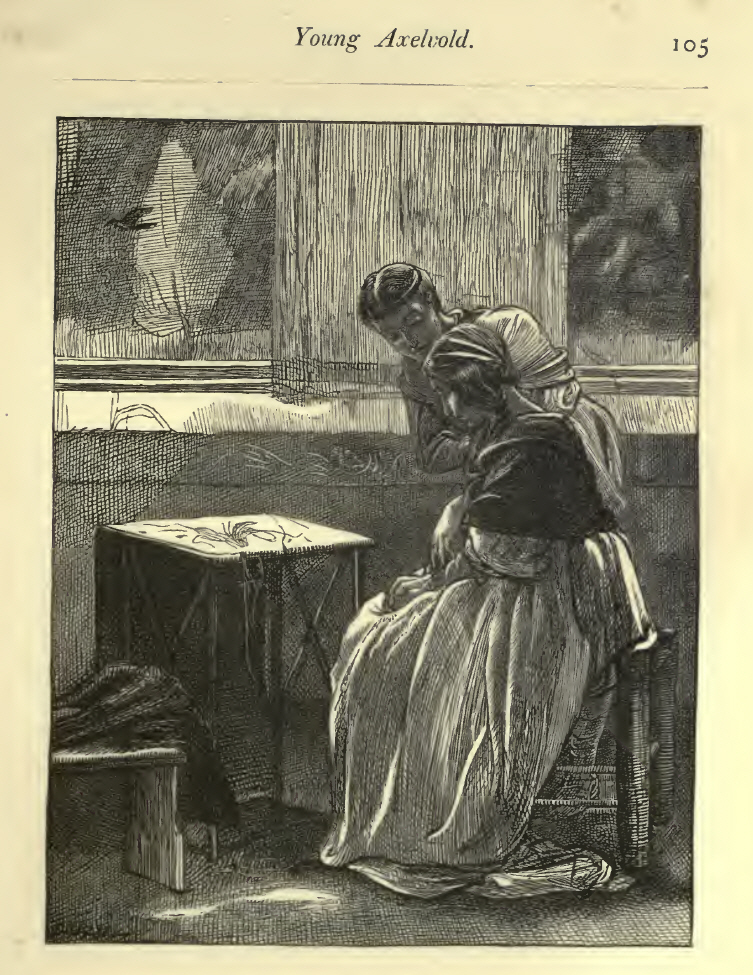 |
|
‘God save thee, foster-mother dear! ‘God save thee, dearest Axelvold! 106 It was the pale young Axelvold, ‘Then sheathe thy knife, and hasten down, It is the fair young Axelvold, And some are brown, and some are fair, ‘God save ye, wives and maidens eke, And silent sat the women all, 107 ‘God save thee, then, my true mother, Fair Ellen stood with downcast eyes, She took the gold brooch from her breast, ‘O hearken to me, dear mother mine! ‘O hearken, dearest mother mine! Fair Ellen clutched her brooch of gold, 108 ‘Haste, haste thee to the palace hall, ‘Haste, haste thee to the palace hall, It is the fair young Axelvold, ‘All hail, ye knights and merry men, ‘All hail, O dearest father mine! |
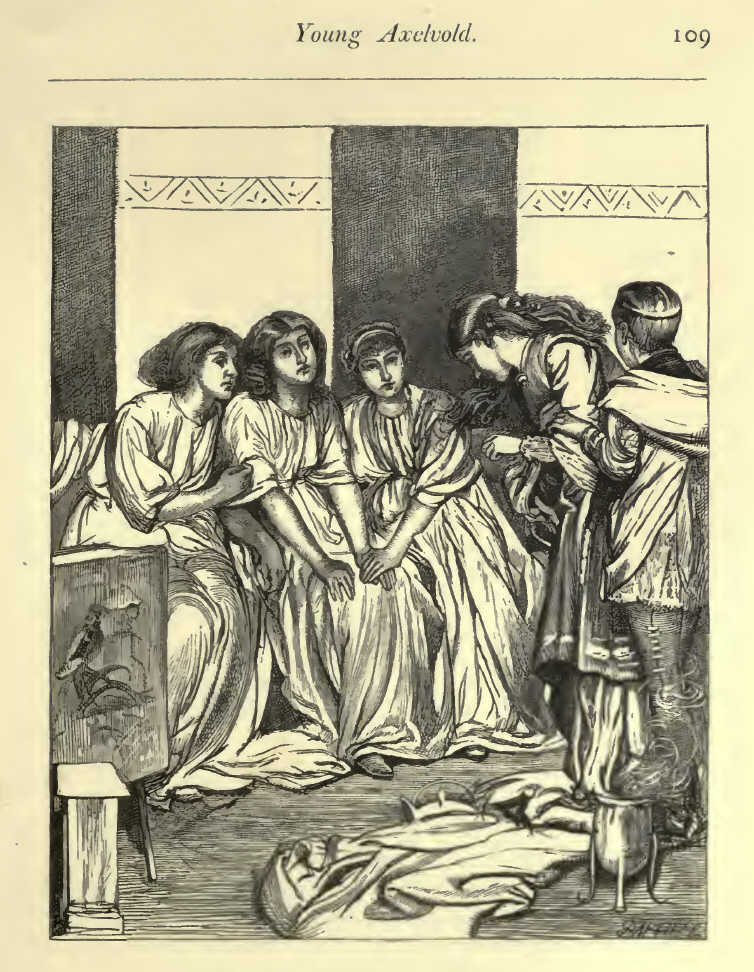 |
|
All frowning sit the King’s men all, Only the King’s son Erland speaks, 110 It was the pale young Axelvold, ‘O shame! among these goodly knights Up sprang Prince Erland eagerly, ‘Thou art indeed, young Axelvold, ’Tis merry, ’tis merry, in palace hall, It was the brave young Axelvold 111
‘WHY planest thou with weary moan, ‘The work I do must all be done ‘Why must thou work while others sleep? ‘My hope, my joy, have wholly died—
112
IT was the young Herr Aage, He paid his troth to Elsie, It was the little Elsie, Uprose the young Herr Aage, Then knocked he with his coffin, 113 Then answered little Elsie, ‘Stand up, my little Elsie, It is the little Elsie, His dew-damp dripping ringlets ‘O listen, dear young Aage! ‘Whenever thou art smiling, 114 ‘Whenever thou art weeping, ‘Hark! the red cock is crowing, ‘Hark! The black cock is crowing, Up stood the pale Herr Aage, It was the little Elsie, |
|||||
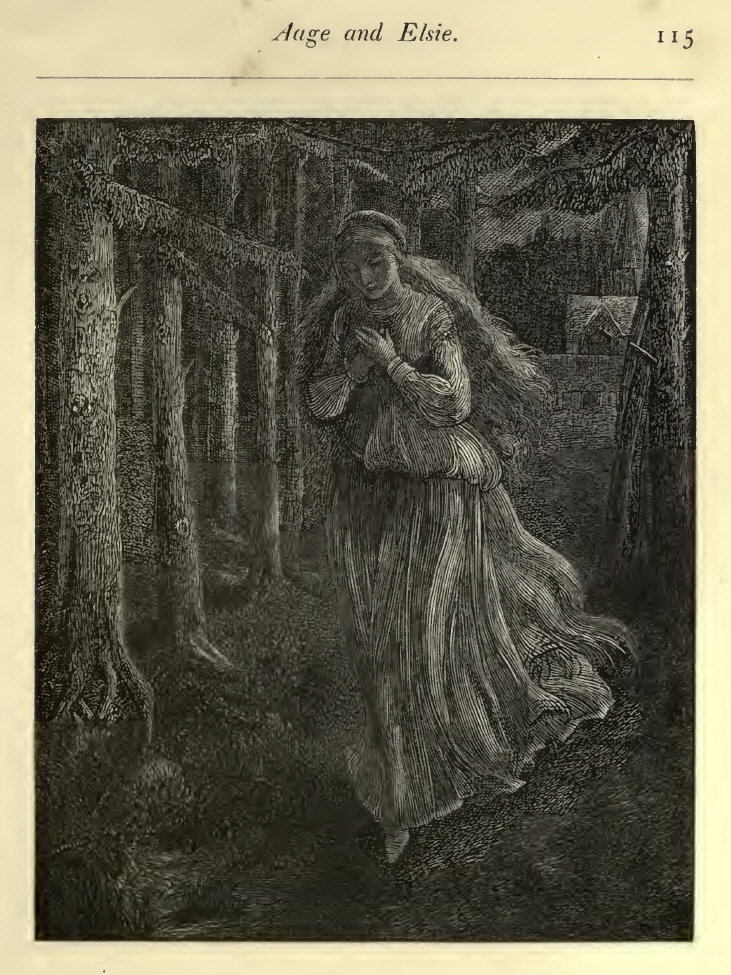 |
|||||
|
When they had passed the forest, When they had passed the kirkyard, 116 ‘O listen, little Elsie, ‘Look up, my little Elsie, She raised her eyes to heaven, Home went little Elsie,
117 OR, THE COUSINS.
I. SIR AXEL BETROTHS THE CHILD WALBORG.
THEY scattered dice on the golden board, And up and down were scattered the dice, Dame Juliet and Queen Malfred The bonnie bairn with apples and flowers 118 He greeted the dames and maidens fair, He tapped her on the white, white cheek, Then, covered o’er with seams of gold, Then up and spake his mother dear, For plaything to the bonnie bairn |
|||||
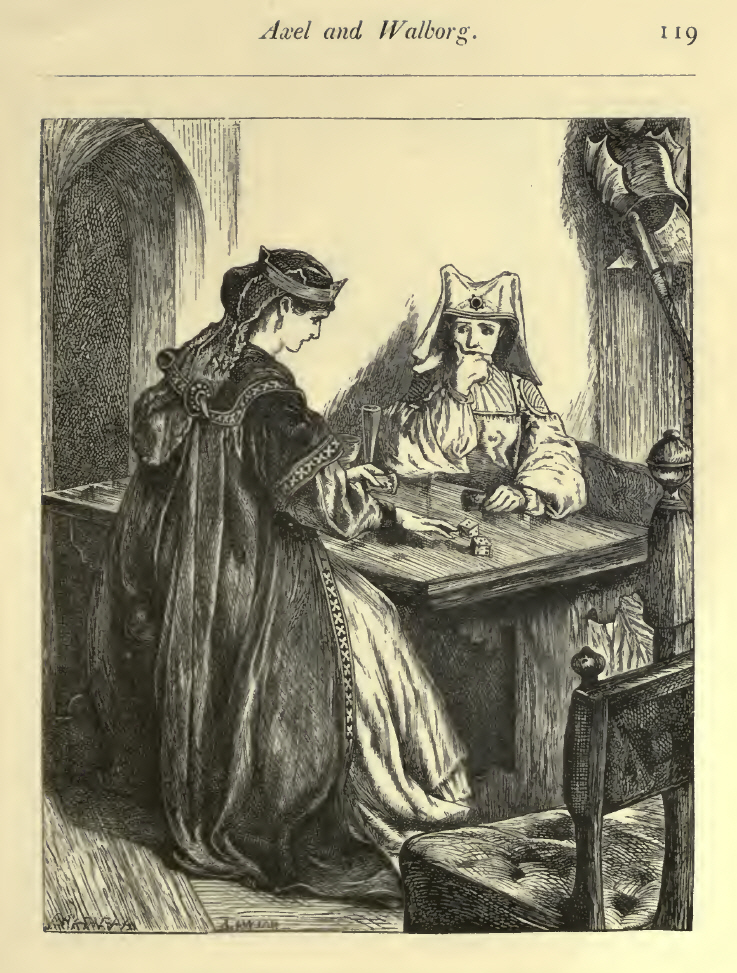 |
|||||
|
‘Now, mark thou well, my little bride, 120 II. SIR AXEL’S RETURN FROM AFAR.
’Tis bright, bright where Sir Axel rides, In cloister walls she learns to read, She turns into a maiden fair, Eleven years she in cloister dwelt, Sir Axel serves in the Emperor’s Court, |
|||||
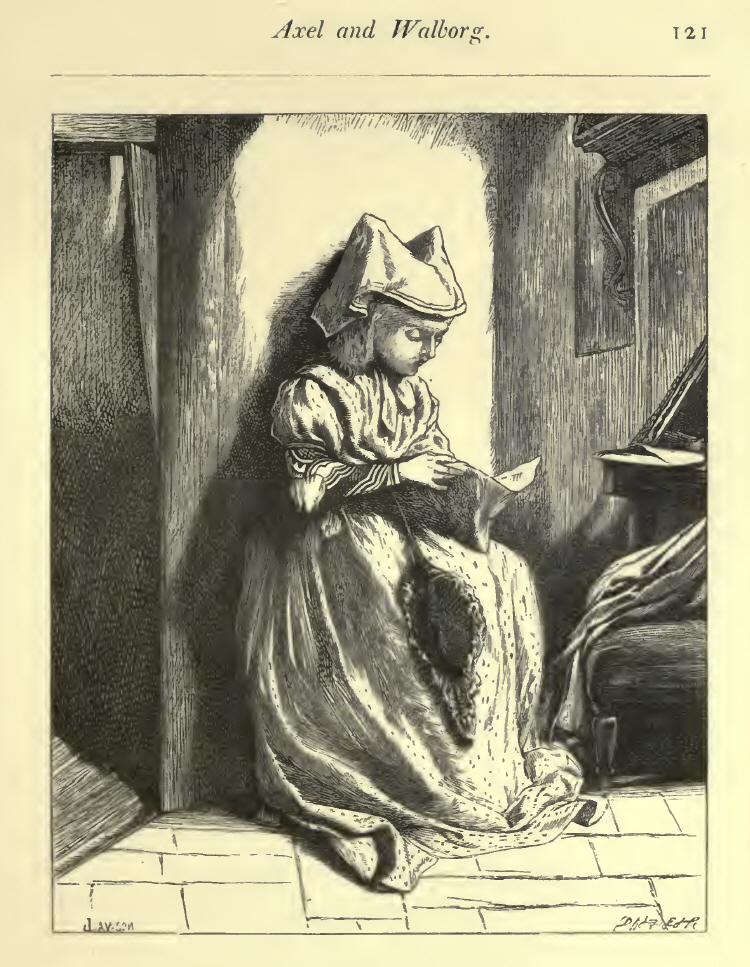 |
|
Sir Axel, sweetly stretched in sleep, Sir Axel in the high chamber 122 He dreams he sees sweet Walborg stand Early at morning, at dawn o’ day, Swiftly he saddled his good gray steed, It was Sir Axel Thorsen, ‘Well met! Good day, thou pilgrim gray! ‘Norway it is my fatherland; 123 ‘If thou art sprung of Gildish race, ‘Fair Walborg is a maiden sweet! ‘Full oft fair Walborg have I seen, ‘And she is now a woman grown, ‘Dame Juliet sleeps ’neath kirkyard stone, ‘And gold is on her small white hand, 124 ‘They call her Axel’s own true-love, It was Sir Axel Thorsen drew ‘All hail to thee, my Emperor! ‘For strange men seek my goods and gear, ‘Leave shalt thou have right willingly, With armèd men from the Emperor’s Court 125 With thirty armèd men behind, Up to his mother’s castle gate ‘Thou standest here, my sister sweet, ‘With that sweet May it fareth well, ‘Thy counsel, sister, give to me, ‘Go, dress thyself in beauteous silk, 126 126 III. THE RE-MEETING.
It was Sir Axel Thorsen He touched sweet Walborg’s white, white hand, She brake the seal, and on her knee There lay five rings of red, red gold, |
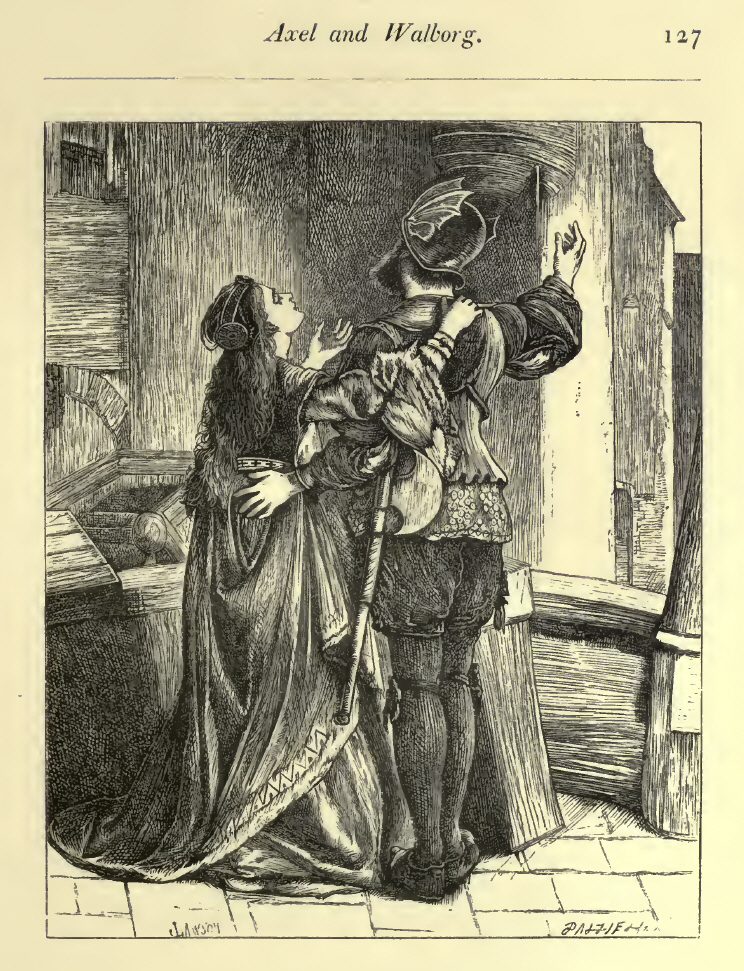 |
|
‘Thou vowed to be his own true-love, There on the castle balcony, 128 By Mary Mother did they sware, Sir Axel rode to the Emperor’s Court
IV. PRINCE HOGEN WOOS WALBORG.
For months full five they dwelt apart, Eleven fair and gallant knights ‘Hearken to me, O sweet Walborg! 129 ‘Hearken to me, Prince Hogen, Wroth grew the young Prince Hogen,— ‘Hail unto thee, dear mother mine! ‘In honour and truth I sue and woo, ‘If May Walborg her troth hath given, ‘Full many a May is at the Court, 130 ‘Thou canst not win the maid by force,— More wroth grows young Prince Hogen, ‘Why paceth my lord so sadly forth, ‘A grievous woe hath happ’d to me, ‘Ne’er shall he bear the maiden home, ‘And they are born of two sisters, 131 ‘Thence brethren by the cloister law ‘To chapter summon priests and clerks,
V. THE CHURCH DISSOLVES THE BETROTHAL.
It was the young Prince Hogen The earls around the broad board stand, ‘Your bonnie niece, the sweet Walborg, 132 Answered the maiden’s uncles three, It was the noble uncles wrapt And first they hailed the comely Queen, ‘Hail unto thee, O bonnie niece! ‘And have ye falsely promised me? Then answered back her uncles three, 133 It was the young Prince Hogen, It was Erland the archbishòp, Proud Erland stood before the board, ‘I have a bonnie maiden wooed, They wrote the solemn summons out, The matin-song was sounding, 134 The knight he climbs upon his steed, The knight hangs o’er his saddle-bow,— Without the Kirk of our Ladye There in the aisle are the lovers met There meeteth them the archbishòp Then forth stept Knud the Black Friàr, 135 The record old of the convent cold Cousins by birth they surely were They both were born of Gildish race, ‘One nurse held both unto the font Yea, kin they were by birth and blood, Up to the altar they were led, 136 They placed the kerchief in their hands, ‘The kerchief ye have cut in two, They took the ring from her fingèr, Sir Axel on the altar cast _____
Ballad Stories of the Affections - ‘Axel and Walborg’ continued or back to Ballad Stories of the Affections - Contents
|
|
|
|
|
|
|